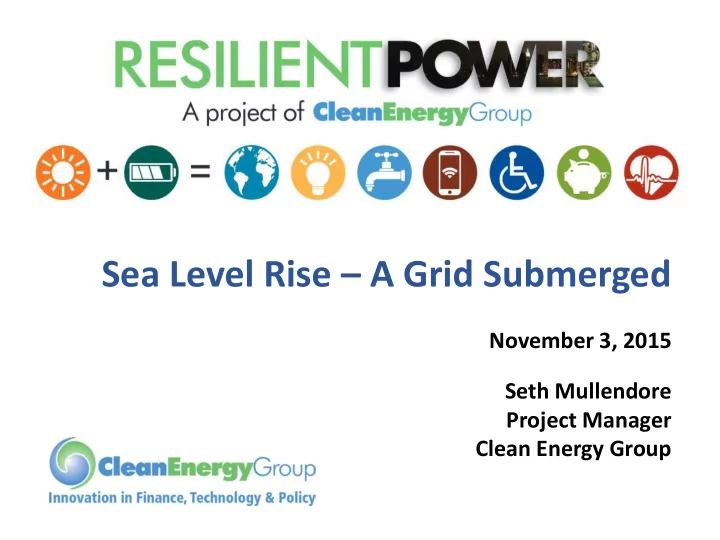

Sea Level Rise – A Grid Submerged November 3, 2015 Seth Mullendore Project Manager Clean Energy Group
Housekeeping
Who We Are www.cleanegroup.org www.resilient-power.org 3
Resilient Power Project • Increase public/private investment in clean, resilient power systems • Engage city officials to develop resilient power policies/programs • Protect low-income and vulnerable communities • Focus on affordable housing and critical public facilities • Advocate for state and federal supportive policies and programs • Technical assistance for pre-development costs to help agencies/project developers get deals done • See www.resilient-power.org for reports, newsletters, webinar recordings 4
Today’s Speakers • Steve Clemmer , Director of Energy Research & Analysis, Union of Concerned Scientists • Julie McNamara , Energy Research Associate, Climate and Energy Program, Union of Concerned Scientists
Lights Out? Storm Surge, Blackouts, and How Clean Energy Can Help
Hurricane Sandy was a wake up call
Storm surge and coastal flooding: A major cause of power outages Electric facilities less than 4 feet above local high tide
Outages from severe weather are rising U.S. Electric Grid Disruptions, 2000-2014 60 Hurricane Irene All Events Number of Electric Disturbance Events 50 Weather-related Events Hurricane Linear (All Events) Sandy 40 Linear (Weather-related Events) Hurricane Ike Hurricanes 30 Frances, Ivan, and Jeanne Hurricanes 20 Katrina and Rita 10 0 2000 2001 2002 2003 2004 2005 2006 2007 2008 2009 2010 2011 2012 2013 2014 Electric Disturbance Event Date
Costs are also rising Billion-dollar Disaster Events by Year, 1980-2014 18 Wildfire 16 Drought Winter Storm 14 Freeze Number of Events 12 Flooding Tropical Cyclone 10 Severe Storm 8 6 4 2 0 1980 1982 1984 1986 1988 1990 1992 1994 1996 1998 2000 2002 2004 2006 2008 2010 2012 2014
The impacts can be devastating
The centralized grid is vulnerable
Power plants, substations, and flooding
Mapping flooding in five regions * Delaware Valley *Southeastern Virginia *South Carolina Lowcountry * Central Gulf Coast *Southeastern Florida
Delaware Valley Power Plants Substations Exposed Unexposed Exposed Unexposed >0 – 20 MW >20 – 200 MW >200 MW
Delaware Valley 2050 40 30 20 10 0 2012 2030 2050 2070
Southeastern Virginia 2050
South Carolina Lowcountry 2050
Southeastern Florida 2050
Central Gulf Coast 2050
So: What Can We Do? So, How Can We Keep the Lights On?
Protect, Accommodate, Retreat
Back-up generators are prone to failure
Renewables can increase electricity resilience New Orleans Atlantic City, NJ
Wind and solar costs are falling
Combined heat and power
Energy efficiency: Reducing the problem by reducing demand
Microgrids can reduce outages
Power plants are the largest source of U.S. global warming emissions Agriculture Electricity 9% Commercial & Residential 12% 31% 20% Industry 27% Transportation
Recommendations Prepare grid for current and future impacts Increase the electricity resilience of communities Adopt strong policies to reduce GHG emissions
Thank You www.ucsusa.org/LightsOut
Sign up for the RPP e-Distribution List to get notices of future webinars and the monthly Resilient Power Project Newsletter : http://bit.ly/RPPNews-Sign-UP More information about the Resilient Power Project, its reports, webinar recordings, and other resources can be found at www.resilient-power.org. 6
Thank you for attending our webinar Seth Mullendore Project Manager Clean Energy Group seth@cleanegroup.org Find us online: www.resilient-power.org www.cleanegroup.org www.facebook.com/clean.energy.group @cleanenergygrp on Twitter @Resilient_Power on Twitter 7
Extra Slides
Substation Inundation Charts Southeastern Florida Delaware Valley 150 40 30 100 20 50 10 0 0 2012 2030 2050 2070 2012 2030 2050 2070 Southeastern Virginia Central Gulf Coast 60 80 40 60 20 40 0 20 2012 2030 2050 2070 0 2012 2030 2050 2070 South Carolina Lowcountry 30 20 10 0 2012 2030 2050 2070
Recommend
More recommend